Politics latest news: Allowing Sarah Everard vigil during pandemic would have caused 'widespread disobedience'
Britain must be 'match fit' for post-Brexit world, says Boris Johnson
Boris Johnson vows to restore aid spending following Tory backlash
Coronavirus latest news: Halting AstraZeneca vaccine is a 'disaster' for jab uptake in Europe
The Government could not make an exception for the Sarah Everard vigil to go ahead because it may have led to "widespread disobedience" with Covid restrictions, the Foreign Secretary has said.
During a Commons debate yesterday, senior Conservative MP Sir Charles Walker called for the ban on protests to be lifted immediately, saying: "This House criminalised the freedom of protest. This House – us. Not Dame Cressida, not the Metropolitan Police – we did. We criminalised the freedom to protest collectively."
He added: "We are up to our eyeballs in this."
Asked about these comments, Dominic Raab told Sky News it was "certainly true" that Parliament had "legislated to restrict the ability to come together in gatherings for a temporary period because of this pandemic".
But the "thorny issue is how we get the balance right between peaceful protest... whilst also the public protection as we come through this vicious and deadly pandemic," Mr Raab said.
"The concern would be if we made exceptions for one or another, however compelling the case was, that we would start to see more widespread disobedience or non-compliance with the rules and then what would that mean for public health?"
Follow the latest updates below.
11:51 AMLabour MP quits, prompting Red Wall by-election
Labour MP quits, prompting Red Wall by-election
Labour MP Mike Hill has resigned, prompting a by-election for his seat of Hartlepool.
Mr Hill has been the MP for the Red Wall constituency since 2017.
The tweet below shows why this move is provoking such interest as it could become a fascinating battle ground to see whether Labour's hopes of regaining support that it lost in 2019 can be met.
Wow by-election in Hartlepool. Labour won by 3.6k votes in 2019 but the opposition vote was completely split between the Tories and the Brexit Party (Tice stood there). pic.twitter.com/6F29zshM93
— Sam Freedman (@Samfr) March 16, 2021
11:42 AMNuclear warhead cap lifted because of 'evolving security environment'
Nuclear warhead cap lifted because of 'evolving security environment'
The Government will lift a cap on the number of nuclear warheads in the UK arsenal in response to the "evolving security environment", the integrated review of the UK's defence has confirmed.
By the mid-2020s there had been a commitment that no more than 180 warheads would be held but the stockpile could now increase to 260.
A policy of "deliberate ambiguity" will mean the public will not be given figures for the operational stockpile or how many missiles and warheads are deployed.
Ahead of the publication of the integrated review today, Dominic Raab told the BBC that "over time as the circumstances change and the threats change, we need to maintain a minimum credible level of deterrent".
The Foreign Secretary said nuclear weapons were "the ultimate insurance policy against the worst threat from hostile states."
11:39 AMAnother pandemic this decade is 'realistic possibility', defence review warns
Another pandemic this decade is 'realistic possibility', defence review warns
The world could see another pandemic in the coming decade, the integrated review warns, despite the lessons learned from the Covid-19 outbreak over the last year.
"Another novel pandemic remains a realistic possibility," reads one line in a section about the threats to global health in the coming years.
There is also a warning about the danger of antimicrobial resistance, with deaths currently forecast to rise from 700,000 a year today to 20 million a year by 2050.
"Infectious disease outbreaks are likely to be more frequent to 2030," the document warns.
It has been published ahead of Boris Johnson's statement to the Commons at 12:30m.
11:37 AMBoris Johnson vows to restore overseas aid spend to 0.7pc 'when situation allows'
Boris Johnson vows to restore overseas aid spend to 0.7pc 'when situation allows'
Boris Johnson has vowed to restore Britain’s commitment to spend 0.7 per cent of national income on aid in his landmark foreign policy review, following a furious backlash over a cut from Tory MPs.
The Prime Minister has pledged in the 114-page integrated review to reinstate the commitment “when the fiscal situation allows”.
It follows savage criticism over a plan announced in November for the Government to reduce its spending to 0.5 per cent to gross national income, overriding the 0.7 per cent commitment enshrined in law and included in the Conservatives’ 2019 election manifesto.
11:36 AMChina 'biggest state-based threat' to UK - but integrated review calls for 'positive' relationship
China 'biggest state-based threat' to UK - but integrated review calls for 'positive' relationship
China is "the biggest state-based threat to the UK’s economic security", Boris Johnson's integrated review has said, noting the country is a "systemic competitor", with its “increasing power and international assertiveness likely to be the most significant geopolitical factor of the 2020s”.
Mr Johnson has been under pressure from Tory backbenchers to take a tougher line with Beijing.
However overall the language in the review highlights the need for continued cooperation.
"We will invest in enhanced China-facing capabilities, through which we will develop a better understanding of China and its people, while improving our ability to respond to the systemic challenge that it poses to our security, prosperity and values - and those of our allies and partners.
"We will continue to pursue a positive trade and investment relationship with China, while ensuring our national security and values are protected.
"We will also cooperate with China in tackling transnational challenges such as climate change."
11:32 AMUK must be 'match-fit' to face 'acute threat' of Russia and China, says Boris Johnson
UK must be 'match-fit' to face 'acute threat' of Russia and China, says Boris Johnson
The UK must be "match-fit for a more competitive world", Boris Johnson said as he set out a foreign policy strategy for the country's role following Brexit and the rise of China as a global force.
The strategy, which includes a plan to increase the UK's nuclear stockpile, will see Britain tilt towards the Indo-Pacific region as the world's "geopolitical and economic centre of gravity" moves east.
But closer to home, Russia still remains the "most acute threat to our security", the document said.
In his foreword to the Integrated Review Of Security, Defence, Development And Foreign Policy, published ahead of his statement to the Commons today, the Prime Minister said Brexit marked a "new chapter in our history" and the UK was now "open to the world, free to tread our own path".
Mr Johnson said: "Few nations are better placed to navigate the challenges ahead, but we must be willing to change our approach and adapt to the new world emerging around us.
"Open and democratic societies like the UK must demonstrate they are match-fit for a more competitive world."
11:19 AMHealth secretaries will 'sign off' future NHS appointments, says Matt Hancock
Health secretaries will 'sign off' future NHS appointments, says Matt Hancock
Government reforms of the NHS would see the Health Secretary "sign off" appointments, but not make them, Matt Hancock has said.
The given secretary of state would not be able to order supplies from a particular suppliers "in the same way I can't now," he added.
Mr Hancock told the health committee that "NHS-E would make appointments but they are signed off by Secretary of State.
"These reforms are moving appointments to joint appointments in which the secretary of state would have to be content that an appointment is appropriate rather than secretary of state-appointed."
Decisions about regional funding would "follow a formula" rather than being specifically directed by an individual health secretary, he added.
11:14 AMHealthcare reforms will strengthen accountability and integration, says Matt Hancock
Healthcare reforms will strengthen accountability and integration, says Matt Hancock
Jeremy Hunt then moves onto the white paper, starting with accountability within the NHS.
Matt Hancock says the reforms will "strengthen integration, reduce bureaucracy and strengthen accountability within the NHS".
He says they will build on existing systems within the NHS, and points to the vaccine rollout as an example of a recent success.
Accountability can only be improved with "high quality analysis and public understanding of how each system is doing", he adds, suggesting that a ranking system must be understood by "lay people".
11:11 AMGovernment will cover 'operational costs of Covid', says Matt Hancock
Government will cover 'operational costs of Covid', says Matt Hancock
The Government will "cover the operational costs of Covid", Matt Hancock has said, amid concerns about allocations for such expenses in the Budget.
Jeremy Hunt asks why the extra £7bn the NHS will need for the next financial year has not yet been agreed.
The Health Secretary says that working out how much will be needed was "complicated, not least because you have to see where we are in the pandemic". But the country is in a better place than it was when the Spending Review was decided on in November.
"The central point is that to make an estimate of these costs, which is effectively what we will be doing, you need to know the state of the pandemic," he added.
"For the system... the message has been very clear - we will cover the operational costs of Covid."
11:06 AMMatt Hancock: 1pc pay rise for nurses 'is indeed a pay rise'
Matt Hancock: 1pc pay rise for nurses 'is indeed a pay rise'
Jeremy Hunt has called to order the final session on the Government's white paper on health and social care reform, welcoming his successor Matt Hancock to give evidence to the committee.
Firstly, however, he wants to know about the one per cent pay rise fir nurses, asking the Health Secretary why this was the department's recommendation.
Mr Hancock says the NHS was "carved out of the pay freeze" that has been applied to other public sector workers, but stuck with "what is affordable".
However he stresses they should wait for the independent pay review board.
Challenged on the "uncertainty" around whether it is a real-terms pay cut, he says inflation is "below one per cent" and it is therefore "indeed a pay rise".
However inflation is forecast to reach 1.7 per cent this year.
10:55 AMHave your say: Is the UK sufficiently prepared for the threats of the future?
Have your say: Is the UK sufficiently prepared for the threats of the future?
Today we will hear Boris Johnson set out his vision for the UK's defence strategy over the next decade, which is expected to include a lift on the cap of nuclear warheads, as well as plans to fend off cyber attacks from hostile states.
It is also expected to bolster our response to future health threats, such as pandemics.
This morning a former head of MI6 warned that China was a "generational threat", which only get worse as its dominance increased. Yet Dominic Raab insisted "constructive engagement", rather than an "old, outdated Cold War" approach was right.
So is the UK still underestimating the threats posed - or is the integrated review setting the right long-term vision? Have your say in the poll below.
10:39 AMTory board members accuse party of dodging questions over Downing Street flat
Tory board members accuse party of dodging questions over Downing Street flat
Senior Conservatives have accused the party of attempting to dodge questions over the refurbishment of Boris Johnson’s Downing Street flat after a monthly meeting of the party’s board was cancelled at short notice.
Members of the board on Monday expressed frustration over the move, which follows allegations over the weekend that party funds may have initially gone towards the makeover, before a Tory peer stepped in to reimburse the money.
Conservative Party sources insisted that the cancellation was due to a “light agenda” and that members had been notified last week. They added that it was not unusual for meetings to be cancelled.
However, senior party figures believe that the real purpose was to stop members asking “difficult questions” about the refurbishment.
My colleague Harry Yorke has the full story here.
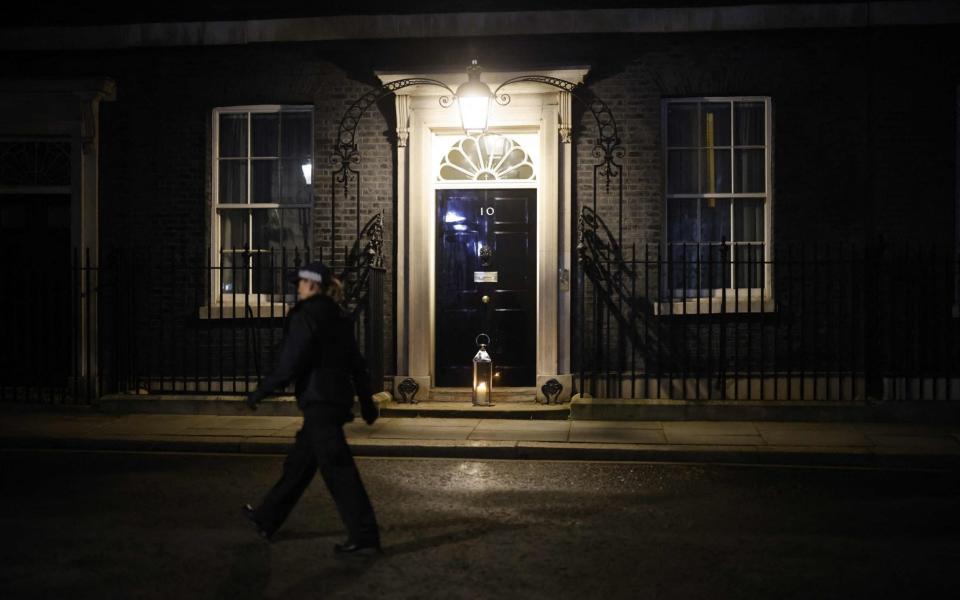
10:24 AMWhat's on the agenda today?
What's on the agenda today?
It's shaping up to be another busy day in Westminster, with MPs gearing up for a second day of debate on the anti-protest bill.
Before that, however, we will hear from ministers including Boris Johnson. Here's what to expect from today:
11am: Matt Hancock, the Health Secretary, gives evidence to Jeremy Hunt and colleagues of the health committee about the white paper and the planned reforms it sets out.
11.30am: Anneliese Dodds, the shadow chancellor, speaks at a Reform event.
12.30pm: Boris Johnson will set out the integrated review of defence and foreign policy to the Commons. You can read our exclusive on that here.
1:40pm: Housing minister Eddie Hughes will make a statement on levelling up.
2pm: Nicola Sturgeon, Scotland’s First Minister, makes a statement to the Scottish parliament about Covid.
From 2:50pm: MPs will begin debating the Police, Crime, Sentencing and Courts Bill, ahead of a vote at 7pm.
10:10 AMData reveals new UK peak in daily Covid deaths
Data reveals new UK peak in daily Covid deaths
The UK has registered a new high watermark for daily deaths caused by Covid.
A total of 147,681 deaths have now occurred in the UK where Covid-19 was mentioned on the death certificate, the ONS said.
The most number of deaths to occur on a single day was 1,463 on January 19.
During the first wave of the virus, the daily death toll peaked at 1,459 deaths on April 8.
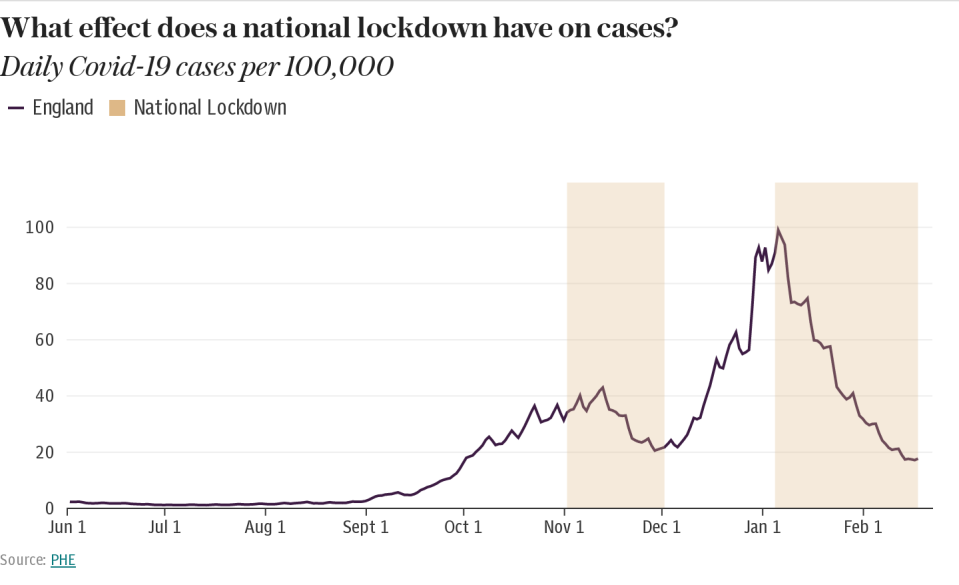
10:08 AMCovid deaths drop to lowest level in five months
Covid deaths drop to lowest level in five months
The number of Covid deaths has fallen to the lowest nevel since the beginning of November, as the rate dropped more than a quarter week-on-week.
A total of 2,105 deaths registered in England and Wales in the week ending March 5 mentioned Covid-19 on the death certificate, according to the Office for National Statistics (ONS), down 28 per cent on the previous week's total.
That is the lowest rate since the week beginning November 6.
Nearly one in five (18.2 per cent) of all deaths registered in England and Wales in the week to March 5 mentioned Covid-19 on the death certificate.
All regions of England recorded a week-on-week fall in the number of Covid-19 deaths, with the South East registering the highest number (328, down 32 per cent from 481 in the previous week". Eastern England saw the second highest number: 277, down 18 per cent from 337.
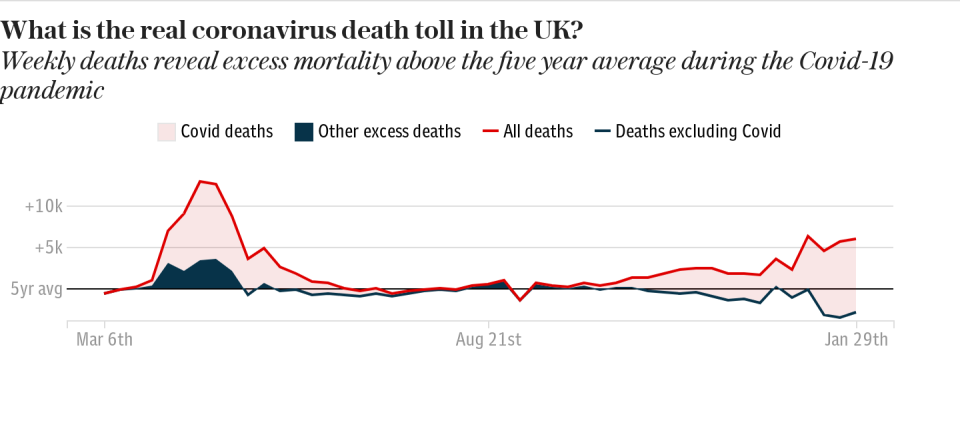
10:00 AMA year of lockdown: the three big coronavirus calls that the Government got wrong
A year of lockdown: the three big coronavirus calls that the Government got wrong
Associate Editor Gordon Rayner is continuing his series of articles, looking back over the decisions taken as coronavirus spread throughout the UK a year ago.
In today's deep-dive, he explores three of the big calls that the Government got wrong - including defying the World Health Organisation’s advice to: “Test, test, test.”
Six days before that recommendation was issued, Britain had formally abandoned contact tracing. Jenny Harries, the deputy chief medical officer for England, later argued the WHO’s advice was aimed at less “well-developed” nations and was not “appropriate” for the UK.
The decision, and the reason given for it, baffled the public.
“The fact that we abandoned test and trace – I don’t think history is going to be kind to us for that,” admitted one source at the heart of government.
09:49 AMViolence against women and girls 'not inevitable', says Government adviser
Violence against women and girls 'not inevitable', says Government adviser
A Government adviser has said the "social contract" about women's safety has been broken, but that violence is "not inevitable".
Nimco Ali said it was "heartbreaking" that women and men in the UK "do not trust each other", telling ITV's Good Morning Britain she wanted "more voices" contributing to the reopened consultation on the Government's violence against women and girls strategy.
She added: "I would want to see things like sexual harassment on the street being banned. I want to see better education. And I really want to understand that we have a social contract that has been broken.
"The fact that women and men in this country do not trust each other, and that is heartbreaking. But ultimately I also know that violence against women and girls is not inevitable, it can be prevented."
She added: "There is a moment now that this Government and Parliament itself really does want to be able to listen to women and do better for women."
09:35 AMCovid blood clot risk 'far, far exceeds' risk from vaccine, expert says
Covid blood clot risk 'far, far exceeds' risk from vaccine, expert says
The risk of blood clots from Covid "far exceeds" any potential risks from vaccination, an expert has said, in the wake of several EU countries pausing their rollouts.
Professor Anthony Harnden, deputy chairman of the Joint Committee on Vaccination and Immunisation (JCVI), told Good Morning Britain that around 11 million doses of the Oxford/AstraZeneca coronavirus vaccine had been administered in the UK and experts were "not seeing any increase" in signals of blood clots between those vaccinated and what would be expected in the general population.
He emphasised that the JCVI, the European Medicines Agency (EMA), the UK's Medicines and Healthcare products Regulatory Agency (MHRA) and the World Health Organisation (WHO) had all come out to say the vaccine is "safe".
Prof Harnden said "clearly we need to keep a very close monitoring of this situation", but added: "It's really important to remember that Covid is a vascular illness and causes clots all over the body, so the risk of developing blood clots from Covid far, far exceeds any potential risk from the vaccination."
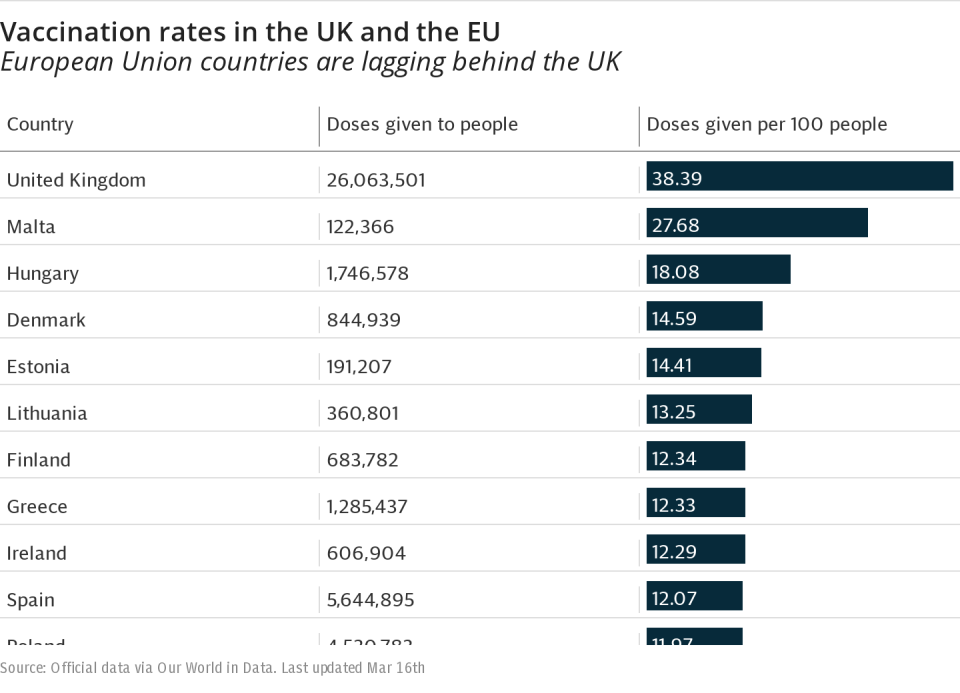
09:22 AMPublic must not 'look the other way' if they see women being harassed, says Dominic Raab
Public must not 'look the other way' if they see women being harassed, says Dominic Raab
Dominic Raab has revealed that he intervened after seeing a woman being harassed, as he urged members of the public not to "just look the other way".
Asked whether he would be comfortable intervening to help a woman being harassed on the street, the Foreign Secretary told Times Radio: "Yes, I've done it before, absolutely.
"People are nervous in those situations, they might be nervous that someone would pull a knife or something like that, and of course we need to be careful, and careful about the advice we give.
"But I do think if you see anyone being attacked, but particularly a woman or someone vulnerable, we have got a duty as citizens to not just look the other way."
Mr Raab stressed people could call the police or "even just to take a picture as everyone does these days", saying: "We do need to take on our responsibilities as members of our communities and our society."
Pressed on what happened in the case where he intervened, Mr Raab added: "It did work in the sense that the individual left with his tail between his legs, but the truth is you just don't know what happens later down the line to the young lady that was affected.
"But what we can't have is tolerating that in front of our eyes and that's an intuitive thing that I feel in my heart."
09:15 AMRussia 'implacably hostile' to UK and allies, says former MI6 head
Russia 'implacably hostile' to UK and allies, says former MI6 head
Russia is "implacably hostile" to the UK and its allied countries, because it suits their "narrative" to fight against a threat, a former head of MI6 has said.
Sir Alex Younger told BBC Radio 4's Today programme on Tuesday: "Russia of course, or at least the Russian government, is implacably hostile to us and our allied countries and I think that's as a matter of their political legitimacy.
"It's in the Russian government's interest for there to be a narrative of external threat to underpin the types of measures that they take to keep themselves in power.
"They have not been a constructive presence internationally, they have been highly disruptive and of course, pretty uniquely, they have got weapons they have quite successfully modernised that could do us enormous damage.
"We don't have to behave like the Russians, we have got our value, we have got our capabilities and most importantly we have our alliances."

09:08 AMChina is 'generational threat', warns former head of MI6
China is 'generational threat', warns former head of MI6
The former head of MI6 has said that China represented a "generational threat", warning that the relationship will become more strained as it grows in dominance.
Sir Alex Younger told BBC Radio 4's Today programme: "There's no doubt that China represents the generational threat and the reason for that is that the idea that China will become more like us as it gets richer or as its economy matured is clearly for the birds.
"That's not going to happen. On the contrary I expect China's Communist Party to double down on its ideology in the future.
"There's going to be an ideological divergence between us in the future, that's going to generate rivalry and reduce trust."
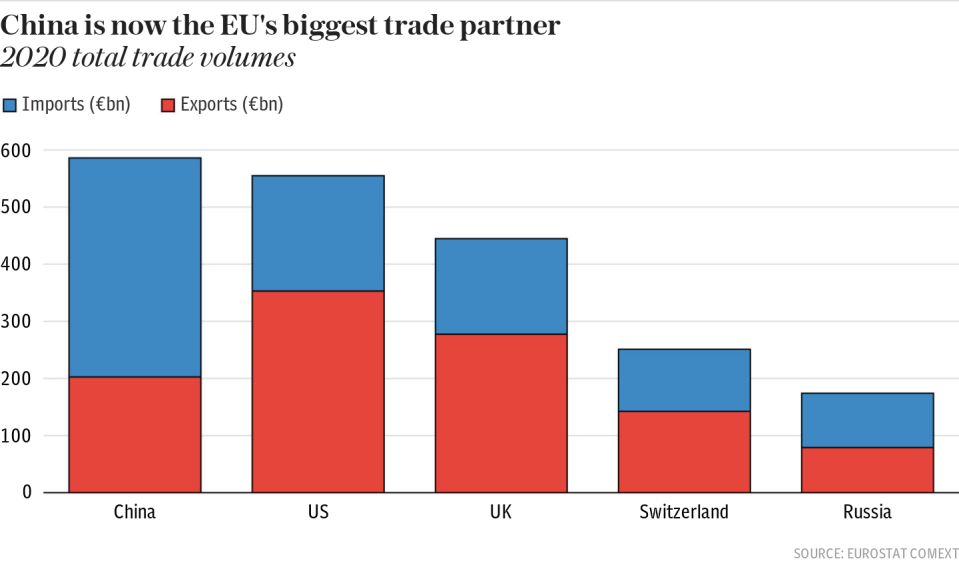
09:01 AMSarah Everard vigil shows 'ridiculousness' of emergency Covid laws, says former police chief
Sarah Everard vigil shows 'ridiculousness' of emergency Covid laws, says former police chief
Sir Peter Fahy, former chief constable of Greater Manchester Police, accused politicians of "rushing into judgment" over how police handle protests during the coronavirus pandemic.
Appearing on Good Morning Britain he was asked if Metropolitan Police chief Dame Cressida Dick had "a case to answer" over the force's handling of the Sarah Everard vigil and amid calls for her to step down.
Sir Peter said: "No, I think that just shows the ridiculousness of the situation, that politicians pass legislation and then rush into judgment on social media [without] even receiving the full report of what's actually happened."
He said Dame Cressida was an "outstanding police leader", adding that police face "a really difficult situation" and that politicians should understand its "complexity".
08:58 AMFormer police chief raises warning over anti-protest bill
Former police chief raises warning over anti-protest bill
The former chief constable of Greater Manchester Police has raised alarm bells over the so-called anti-protest bill going through Parliament, saying it will put officers "at odds with people".
Sir Peter Fahy said "we need to be very wary" about the police, crime, sentencing and courts bill, which MPs will be voting on this evening.
He told Good Morning Britain that the proposed legislation has "a lot of increased police powers" and "brings in a lot of new definitions that are not tested.
"What we see as well, is that the policing of protests has a huge impact on the longer term confidence in policing, and whatever taskforce or meetings or new strategies do that will be hugely eroded if, for instance, women lose confidence in the police because of the policing of protests, because the police are trying to implement public order legislation and the demands of government, which then put them at odds with people who feel very strongly about an issue."
08:54 AMDominic Raab defends £2.6m media briefing room
Dominic Raab defends £2.6m media briefing room
The Foreign Secretary has defended the Government spending more than £2.6 million on creating a White House-style media briefing room in Downing Street after pictures of the refurbishment surfaced this week.
Dominic Raab told BBC Breakfast: "It is not something I'm responsible for but I do think that making sure we communicate with the public is very important.
"We saw that in the press conferences that the Prime Minister and other senior ministers, myself included, had (during the coronavirus pandemic).
"Making sure we communicate directly with the public is something I think they welcome and making sure we can do it in an effective, coherent way is very important."
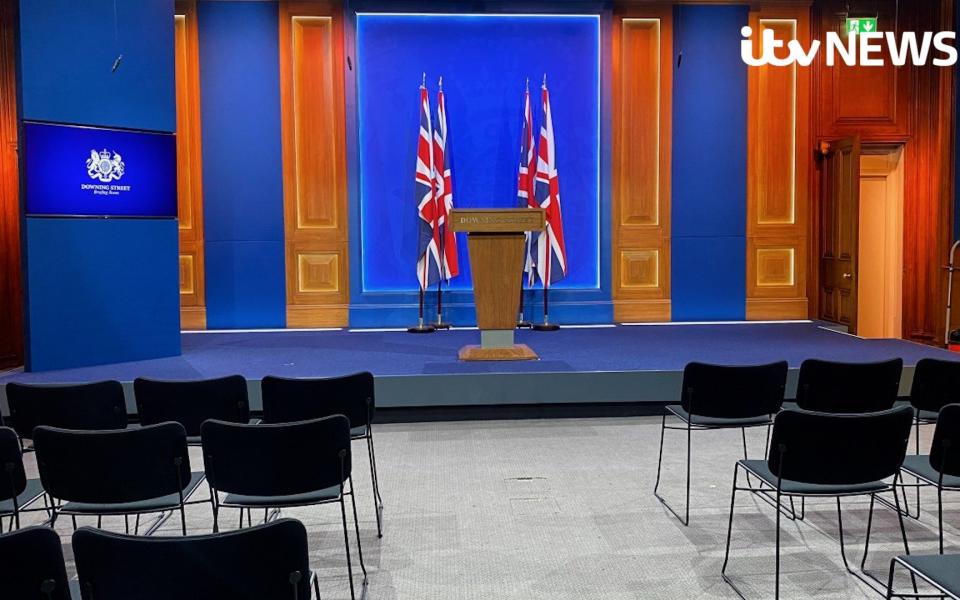
08:52 AMNuclear warheads are 'ultimate insurance policy', says Dominic Raab
Nuclear warheads are 'ultimate insurance policy', says Dominic Raab
Dominic Raab said more nuclear warheads could be required as part of the Integrated Review, as they represented the "ultimate insurance policy" against global threats.
Asked why the Government would want to increase the amount it has, the Foreign Secretary told BBC Radio 4's Today: "Because over time as the circumstances change and the threats change, we need to maintain a minimum credible level of deterrent.
"Why? Because it is the ultimate guarantee, the ultimate insurance policy against the worst threat from hostile states."
In leaked papers seen by The Telegraph, the 100-page strategy, entitled "Global Britain in a Competitive Age", sets out how it will protect overseas territories by "deterring and defending against state and non-state threats".
Read our exclusive story here.
08:50 AMSociety has 'joint, indivisible stake' in tackling violence against women, says Dominic Raab
Society has 'joint, indivisible stake' in tackling violence against women, says Dominic Raab
Dominic Raab has said there must be a "zero tolerance" approach to violence against women, saying the society has a "joint, indivisible stake" in resolving the problem.
The Foreign Secretary defended the Government's work so far, telling BBC Breakfast: "We've made strides over many years and in many respects in terms of eliminating sexism but it is a very small minority who are responsible for this kind of violence.
"We need to have zero tolerance, of course all of us need to bring our children up the right way, make sure we are promoting education and equality about this.
"But ultimately let's not let off the hook the individuals responsible for these appalling crimes.
"There is an individual responsibility, which is why the criminal justice measures are so important, but I think everyone watching this - and I appreciate women will feel disproportionately fearful and need reassurance - but I fear for my wife, I fear for my sister, my mother going out on the streets.
"I feel as a society we have a huge joint indivisible stake in tackling this issue."
08:30 AMDominic Raab defends cut to overseas aid
Dominic Raab defends cut to overseas aid
Dominic Raab has said it is "not accurate" to say the UK is breaking its commitment on international aid spending, which has been cut from 0.7 per cent of GDP to 0.5 per cent.
"Because of the acute financial pressures we face... yes we have had to take the decision to shift temporarily from 0.7 to 0.5 per cent. Butt we are still giving £10bn of aid, we are still one of the leading contributors of aid around the world."
But challenged over whether ti would be put to a vote in the Commons, he said there was "nothing we have done, r will do" that breaches international law.
Although the Government "wants to meet" its manifesto commitment, he says people "understand" that the pandemic has changed things.
"Let's have a bit of perspective," he added.
08:27 AMDominic Raab defends UK as 'force for good in the world' amid Brexit legal action
Dominic Raab defends UK as 'force for good in the world' amid Brexit legal action
Dominic Raab has defended the UK's actions towards the Northern Ireland protocol, following EU legal action over what they argue is a breach of the Brexit treaty.
He said the UK was "one of the stand out members of Nato", and was "adhering" to international laws.
The criticism from the EU "I never hear" from other countries, who "see us as a force for good in the world," he added.
"I think sometimes we don't see ourselves the way the rest of the world see us. An Ipsos Mori poll... polled youngsters around the world found the UK is the most attractive in the world
"I just make the point gently that some f the domestic debate feels rather more insular than the feedback and the view that people around the world have about this country."
08:23 AMUK should not enter 'old, outdated Cold War with China', says Dominic Raab
UK should not enter 'old, outdated Cold War with China', says Dominic Raab
Dominic Raab has insisted the UK should not enter a new "Cold War" with China, insisting the UK must engage "constructively" on many issues.
The Foreign Secretary insisted the UK had stood up to China on issues such as human rights abuses Hong Kong and Xinjiang, noting that Beijing was concerned about its global reputation.
But he added: "It wouldn't make sense, I don't think it would be feasible, to go into some old outdated Cold War with China, there are issues like trade and investment where there are positives but of course we need to protect our intellectual property and infrastructure... and on climate change, we are engaged in constructive ways with China...
"We have been clear we will stand up for open societies, the international rule of law, freedom of navigation... and values of human rights as we have already done with Hong Kong and taken the lead internationally on Xinjiang."
Asked if the UK would consider punitive measures such as sanctions or block trade deals he said there was no trade deal "on the horizon".
08:16 AMDominic Raab defends 'Global Britain' concept
Dominic Raab defends 'Global Britain' concept
Dominic Raab has defended the concept "Global Britain", saying the "once in a generation" Integrated Review will "help answer those questions".
The report, which Boris Johnson will unveil this afternoon, will talk about "marshalling our strengths, why we should feel self-confident, the ingenuity of our people the strength of our Union, our military clout, but also our cultural brand abroad," he told the Today programme.
It sets out "how we can create better paid jobs of the future" as well as protecting the country from threats from both hostile states such as Russia and China as well as pandemics, he added.
08:13 AMDominic Raab 'crystal clear' that AstraZeneca jab is safe
Dominic Raab 'crystal clear' that AstraZeneca jab is safe
The Foreign Secretary has stressed the AstraZeneca vaccine is safe, after a number of European countries have paused their rollouts amid blood clot fears.
Dominic Raab told BBC Breakfast he was "crystal clear... that the UK regulator, the European EU regulator and the WHO all say that the AstraZeneca vaccine is safe and people should continue to take it."
He added: "It is safe, people should get the vaccine and I think it has been very clear, both from the MHRA, the UK regulator, that the risks of taking the vaccine are no more than, in terms of for example blood clots, than the population at large.
"There is no extra risk on the evidence that we've seen, which is why they have authorised the vaccine and haven't taken any further action.
"We respect the process and procedures that some other countries may need to go through but the vaccine is safe and people should certainly continue to take it and to protect themselves and their friends and family."
08:10 AMUK must be 'clear-sighted' about 'disproportionately large' China, says Dominic Raab
UK must be 'clear-sighted' about 'disproportionately large' China, says Dominic Raab
Dominic Raab has warned that the UK must be "clear-sighted" about China, saying the country is "here to stay as a disproportionately large power".
The Foreign Secretary declined to comment on the nuclear warheads plan ahead of Boris Johnson's statement to the Commons today, in which he will set out the Integrated Review.
But Mr Raab stressed that the UK would take a long-term approach to defence, which will include cyber and hostile states.
Asked about China, he told Sky News: "China is here to stay as a disproportionately large power.
"Investment is important, but we will never do anything that puts at risk the integrity of infrastructure or anything like that. If we want to be a leader in the word… to tackle challenges like climate change, of course you have got to deal with China."
He highlighted the stance taken on Hong Kong and Xinjiang, as well as the need to engage with them on climate change, as the kind of action he was taking.
08:06 AMICYMI: Sir Charles Walker tells MPs 'we're up to our eyeballs in this'
ICYMI: Sir Charles Walker tells MPs 'we're up to our eyeballs in this'
Sir Charles Walker has given the Commons another one of his trademark critiques of the draconian Covid restrictions, telling colleagues they were "up to our eyeballs in this".
Speaking during the debate on the so-called anti-protest bill, the vice chairman of the 1922 committee said: "This House criminalised the freedom of protest. This House – us. Not Dame Cressida, not the Metropolitan Police – we did.
"We criminalised the freedom to protest collectively."
He called on Priti Patel to lift those restrictions and "let people get things off their chest", noting that "protest is a safety valve". However the Home Secretary rejected his call.
Watch the moment again below.
"This House criminalised the freedom of protest. Us... not the Metropolitan Police, we did," says Conservative MP Sir Charles Walker who adds, "now is the time to decriminalise the freedom of protest"
Priti Patel says "we are still in a pandemic"https://t.co/Ye003Ar0vD pic.twitter.com/sj8PxkEjcf— BBC Politics (@BBCPolitics) March 15, 2021
08:02 AMRape convictions 'inherently difficult', claims Dominic Raab, amid criticism of drop in rates
Rape convictions 'inherently difficult', claims Dominic Raab, amid criticism of drop in rates
A senior minister has argued that rape convictions are "inherently difficult" because there are often no witnesses, as he defended the decline over the last 10 years.
Over the past five years, cases reported to police and initially recorded as rape have risen sharply. However, the proportion making it to court (prosecutions) in that time has more than halved.
In the year to the end of March 2020, 58,856 cases of rape were recorded by police forces in England and Wales. These led to just 2,102 prosecutions, compared with 3,043 in the previous 12 months.
Dominic Raab said the Government had made it easier for women to "report these appalling crimes" and made it easier "for them to give evidence in a sensitive way".
But increasing conviction rates would require "work on technical ways to do that," he said.
"It is inherently difficult in these cases where you don't have third party", Mr Raab claimed.
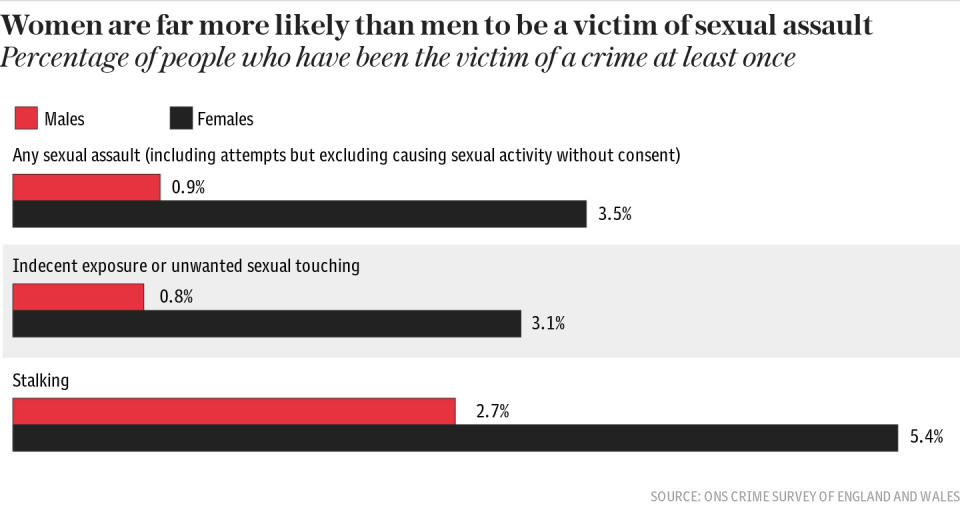
07:58 AMGovernment must do more to make women feel safe, says Dominic Raab
Government must do more to make women feel safe, says Dominic Raab
The Foreign Secretary has admitted there is "more" to do when it comes to improving safety for women on Britain's streets.
Dominic Raab told Sky News: "I think it is appalling that women still suffer the fear, the intimidation, the threats - and I say that as a son, a husband and a brother of a sister.
"Of course we've all got - and I think the vast majority of men will feel this while recognising that women are the ones that face the brunt of this - a stake in society and we all very personally want to see the streets safe for women to walk at night.
"I feel that very personally and very piercingly. The key thing that I look at as a policymaker is what are we doing about it.
"And that's why we are increasing the number of police by 20,000, we've heard new measures to make the streets safer with CCTV and lighting overnight, we've got two bits of legislation going through the House of Commons to increase the sentencing... But clearly we've got to do more."
07:57 AMFour arrested over demonstration against Government's anti-protest bill
Four arrested over demonstration against Government's anti-protest bill
The Metropolitan Police said they arrested four people and issued two fixed penalty notices during protests in central London on Monday afternoon and evening.
The force's statement comes after demonstrators took to the streets of the capital to continue to protest over the policing of a vigil for Sarah Everard on Saturday and over the Government's police, crime, sentencing and courts bill.
The Met said they had "maintained an appropriate policing plan" during the protest around Parliament Square, Trafalgar Square and parts of the West End.
Protesters blocked "a number of roads" and caused traffic disruption, the force added.
Many protesters chose to leave the area when encouraged to do so by officers, but others remained in the Westminster area, the Met added.
07:56 AMJess Phillips blasts Government plans to deploy 'police officers in skinny jeans' to protect women
Jess Phillips blasts Government plans to deploy 'police officers in skinny jeans' to protect women
A senior Labour MP has attacked Government plans to press on with the anti-protest bill by trying to "crowbar in" additional measures such as street lighting and undercover police officers patrolling bars.
Jess Phillips, shadow minister for domestic violence and safeguarding, told BBC Breakfast said ministers had tried to "throw together a plan" in light of Sarah Everarard, based on "police officers in skinny jeans in bars".
"I just think they got caught on the hop," she added. They need to slow this legislation down, stop trying to divide the country about statues" and start thinking about how best to protect women.
Instead ministers should "take it back and look at it again - and try and include us, and I'm happy to help them do it."
07:44 AMExclusive: I will use force to defend Falklands, says PM
Exclusive: I will use force to defend Falklands, says PM
Boris Johnson will pledge to defend the Falklands and Gibraltar with the military, leaked documents have revealed.
As part of the Prime Minister's landmark integrated review into defence and foreign policy, he has vowed to use the Armed Forces to protect the UK and its citizens, which includes its "responsibility to ensure the security of the 14 overseas territories".
In leaked papers seen by The Telegraph, the 100-page strategy, entitled "Global Britain in a Competitive Age", sets out how it will protect overseas territories by "deterring and defending against state and non-state threats".
It adds that the Armed Forces will "deter and challenge incursions in British Gibraltar Territorial Waters" and will "maintain a permanent presence in the Falkland Islands, Ascension Island and the British Indian Ocean Territory".

